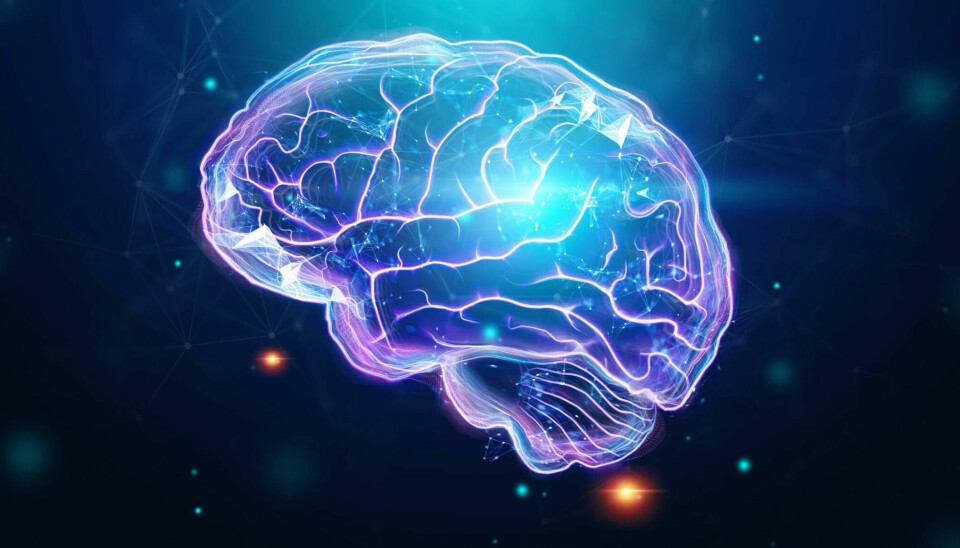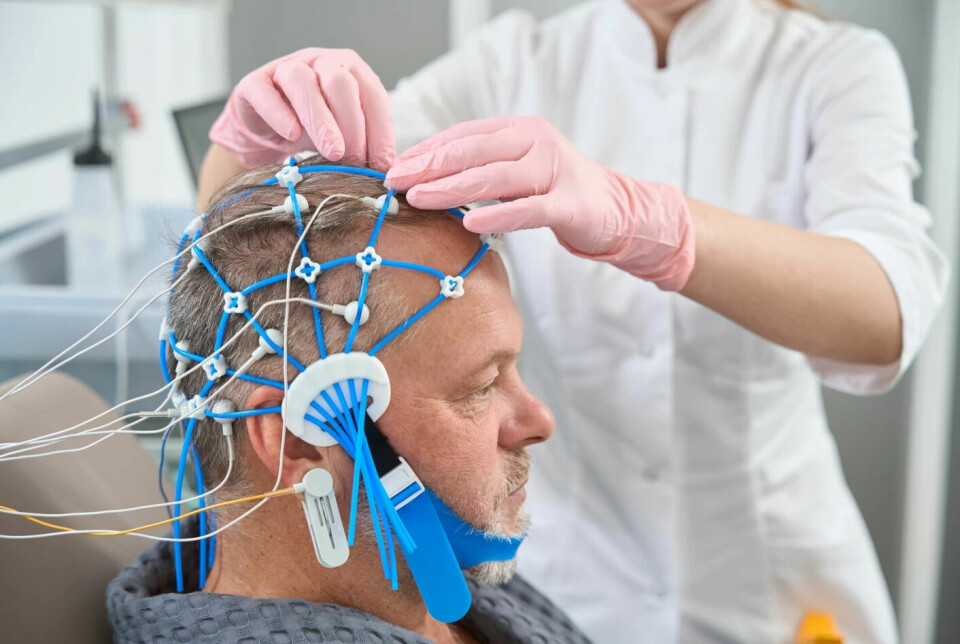
Researchers are developing artificial intelligence that will detect early-stage dementia
The dream is to use the technology for mass screening of the population to uncover dementia, researcher says.
Artificial intelligence (AI) can be useful in healthcare.
AI can help with interpreting images and free up time for the radiologists.
A new study from Sweden showed, for example, that AI-supported mammography led to 20 per cent more cancer cases being detected, according to NRK (link in Norwegian).
The EU research project AI-Mind focuses on artificial intelligence and health.
The goal is to be able to identify who in the group with mild cognitive impairment is at high risk of developing dementia. They could be identified several years before a diagnosis is made today.
The research is led by Ira Haraldsen at Oslo University Hospital.
People with mild cognitive impairment have begun to experience that their memory is failing and have some problems with reasoning and attention. But that does not necessarily mean they have, or will develop, dementia.
“It comes too late”
“The background for our project is a worldwide clinical need. Currently, we are not able to predict your risk of developing dementia if you are affected by mild cognitive impairment,” Ira Haraldsen said during a recent event at Arendalsuka, an annual political festival in Norway.
She believes that the dementia diagnosis comes too late. It comes after clear symptoms have appeared.
“By then, you can alleviate symptoms but you can’t affect the course of the disease. What we want is to shift the diagnosis into another time window,” she said.
The research group plans to create a tool based on artificial intelligence for screening, or mass examination, of the population, Haraldsen explains in an interview with sciencenorway.no. Screening involves examining healthy people to detect disease or precursors to disease before symptoms appear.
“The dream is population-based screening of, for example, all 55-year-olds,” she said.
If it turns out that you are at high risk, you will be followed up, and all risk factors contributing to dementia should be corrected, according to Haraldsen.

Participants from four countries
The study will include 1,000 participants from Norway, Finland, Italy, and Spain.
Participants from Norway and Italy have already been recruited. There are still some missing from Spain and Finland.
The participants are between 60 and 80 years old and have mild cognitive impairment.
“What is interesting is that among people with mild cognitive impairment, 50 per cent develop dementia and 50 per cent do not. Doctors today don’t know which group you belong to,” Haraldsen said.
Researchers in AI-Mind aim to separate these two groups. Who is on the way to developing dementia, and who can be reassured?
“Here to stay”
Karin Persson is a postdoctoral fellow at the Norwegian National Centre for Ageing and Health and is researching dementia.
She is not part of the project and writes in an email to sciencenorway.no that AI-Mind is one of several large projects now trying to find effective ways to diagnose cognitive impairment and dementia early on.
“Common to these new projects is the use of artificial intelligence and focus on developing methods that can predict which people with early symptoms will develop dementia,” she said.
The difference between various projects is the variables they input into the models: whether it’s cognitive tests, EEG, MRI images, genetic data, biomarkers from spinal fluid, blood, and other imaging diagnostics, Persson explained.
“I think artificial intelligence is here to stay, I believe that this is the way forward for effective diagnostics in this field,” she writes.
Brain network undergoing changes
Participants in AI-Mind will take part in four studies over two years.
An electroencephalography (EEG) examination will then be conducted. This is an examination where a cap with electrodes measures electrical activity in the brain.
Blood samples are taken, and participants take a test regarding their ability to think and remember.
Over the two years, researchers will see who gets worse and who stays the same or improves.
Two algorithms will be trained to predict this. One is trained on EEG examinations. It analyses how different areas of the brain communicate with each other.
It has been known for a long time that this changes when dementia develops, Haraldsen explains.

Your brain is a football team
Haraldsen compares what happens in the brain to a football team.
“When you’re very good at football, the ball is constantly passed from one player to another, back and forth. Then suddenly, Haaland storms towards the goal, and then manages to score,” she said at the event. “That's how the brain is also constructed. It works all the time, whether we are asleep or awake. All areas are chaotically in contact all the time. Then a task comes along, and we do it.”
You can see the difference between a football team that collaborates well and one that doesn't. In the latter, maybe only two players pass to each other and exclude the others.
“This is something that happens in the early stages of dementia and mild cognitive impairment. Some areas communicate too frequently with each other, and others are given lower priority,” Haraldsen said.
Algorithms and freedom to find patterns
Researchers are testing two types of artificial intelligence, which Haraldsen describes as classical machine learning and deep learning.
They are asked to divide the participants into two groups based on EEG examinations: Those who will deteriorate and those who will not.
The classical machine learning algorithm is asked to look for characteristics that researchers know are indications of early-onset dementia.
The deep learning model has more freedom and finds its own patterns. Many experts believe that this is the future of artificial intelligence in healthcare, Haraldsen explained. But it is more challenging to understand what the machine is doing and how it arrives at the answer.
Researchers are comparing whether humans and machines come to the same result.
A few years earlier
Eventually, a new artificial intelligence will use the EEG analysis, along with the results from blood tests and the mental test, to say who is at high risk of developing dementia.
It is known that changes in blood tests can be measured several years before a patient receives a dementia diagnosis. Blood tests that can reveal the beginning of the disease have already been successfully tested.
The researchers believe that the AI they are developing can uncover early-stage dementia two to three years before a diagnosis is usually made. Later, it may be possible to push the time window even a couple of years earlier, Haraldsen believes.
The artificial intelligence is planned to be ready for use in 2026. But Haraldsen points out that part two of the study will be necessary for the algorithm to be approved for the market.
The results from the artificial intelligence must be compared to the most reliable way to diagnose dementia, which is to take a spinal fluid sample and imaging diagnostics with MRI or PET, Haraldsen explains.
Is there any advantage to knowing earlier?
Today there is no treatment that can cure dementia and Alzheimer's disease. Is there then any advantage to being diagnosed earlier than today?
Karin Persson at the National Centre for Ageing and Health answers:
“There is much ongoing research on the development of disease-modifying drugs, that is, medicines that do not only affect the symptoms of dementia but can actually stop the disease development.”
This especially applies to Alzheimer's disease, the most common cause of dementia worldwide.
“If these types of medications are to be effective, it will be crucial to get to it early in the disease process before the brain is too attacked and damaged,” she says.
There is a reason why there is a focus on early diagnostics now.
“At the right time”
At the same time, there may be ethical challenges with giving an early diagnosis, especially in cases where the disease cannot be treated. People who are working with this are concerned about these ethical challenges, Persson says.
“The diagnosis must come at the right time. However, there are more treatments that are relevant to dementia other than medication, even if we currently have no cure to stop it,” she says.
Patients who notice changes in their memory and thinking, i.e., their cognitive function, often want information about the cause, Persson continues.
“But it is essential that we balance correctly and that ethical considerations are included in guidelines for diagnosis,” she says.
Medications approved in the USA
There is a lot happening in the field when it comes to early diagnosis and medication.
Three new drugs have been approved in the USA (link in Norwegian). They are based on removing amyloid plaques, a protein that accumulates in the brain with Alzheimer's disease, Persson explains.
They are being assessed by the European Medicines Agency. However, the effects of the medications are relatively small, and the side effects are potentially serious, the researcher explains.
“So far, the follow-up time in the studies has been relatively short, and it will be interesting to see how the patients fare over a longer period,” she says.
Overall, these are not medications that will be given to all people with Alzheimer's disease. Disease stage in the patient, risk of side effects, expected effect, and price will be important factors, Persson explains.
Regarding early diagnosis, an essential development is methods for looking at markers in blood. There have been good results here, which can make early diagnosis easier.
“Again, you have to have a clear thought about who will be tested when these methods become clinically available. Currently, they are used in research in Norway, with ethical principles in mind,” Persson says.
Conflict of interest: Ira Haraldsen is chairman and co-founder of the company BrainSymph, as a spin-off of the AI-Mind project.
———
Translated by Alette Bjordal Gjellesvik.
Read the Norwegian version of this article on forskning.no






































